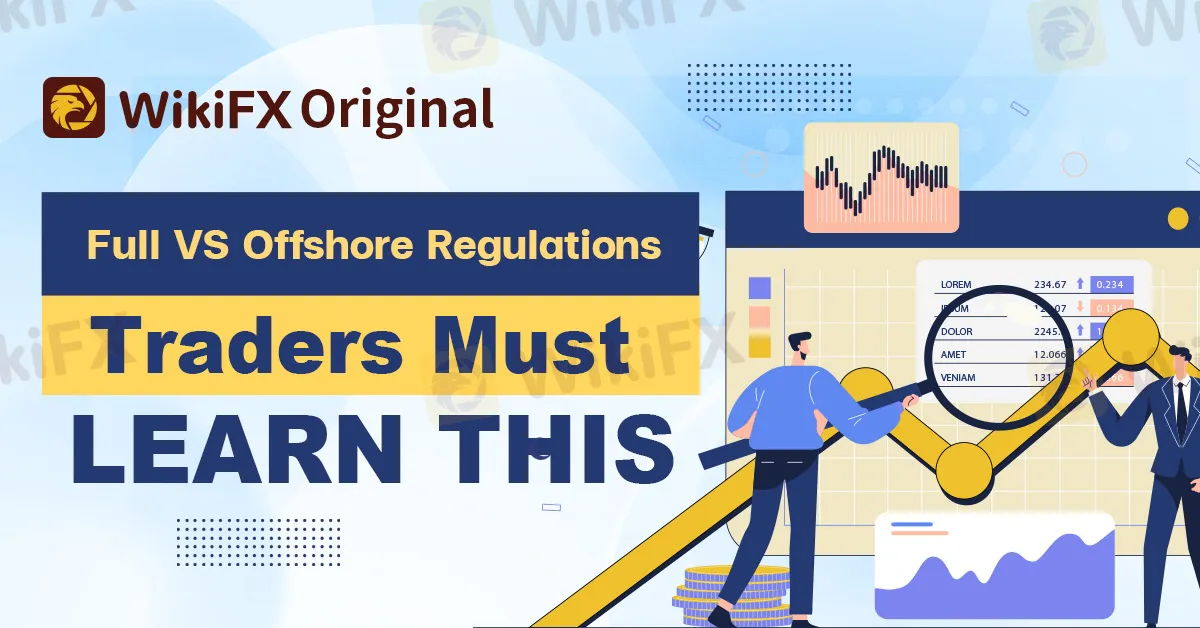简体中文
繁體中文
English
Pусский
日本語
ภาษาไทย
Tiếng Việt
Bahasa Indonesia
Español
हिन्दी
Filippiiniläinen
Français
Deutsch
Português
Türkçe
한국어
العربية
Full VS Offshore Regulations | Traders Must Learn This
Abstract:Discover the differences between full regulation and offshore regulation in the financial sector and learn how WikiFX empowers traders with essential regulatory insights to make informed decisions in the complex financial market landscape.

In the ever-evolving financial sector, understanding the different types of regulations is crucial for traders and investors seeking a safe and reliable trading environment. Regulations can be broadly categorized into two types: full regulation and offshore regulation, each with its own set of advantages and considerations.

When operating under full regulation, financial entities face stricter rules on license issuance and management. This can provide traders with a sense of security, knowing that the regulatory authorities are actively monitoring and supervising the market. Countries like the European Union members, the United Kingdom, the United States, Australia, Hong Kong, Israel, and Russia implement full regulation, making it a prevalent practice in many established financial markets.
However, with the benefits of comprehensive oversight come more extensive requirements and higher costs. Full regulation often involves substantial management fees, including application fees, activation fees, and annual fees. Moreover, entities operating within these jurisdictions are subject to minimum capital requirements to ensure financial stability. The process of obtaining licenses can be intricate, involving extensive due diligence and suitability procedures for companies, directors, and shareholders.

On the other hand, offshore regulation provides an alternative for traders seeking a more flexible and cost-effective approach. Obtaining an offshore license is generally faster, taking only a few months in most cases, depending on the regulatory jurisdiction. The operational costs and management fees tend to be lower, making it an attractive option for those seeking more accessible entry points into the market.
A key advantage of offshore regulation is the relaxed conditions for obtaining licenses. Many offshore regulatory jurisdictions do not require physical presence for office space, company directors, or shareholders. This can significantly reduce the administrative burden and costs associated with establishing a physical presence in a foreign country.
Moreover, offshore regulation often imposes limited reporting requirements, primarily focusing on capital adequacy and financial conditions. This lighter reporting burden allows entities to operate with greater ease and lower compliance costs. In many offshore jurisdictions, there is no requirement for financial services to be provided exclusively to local residents or within the jurisdiction, providing more flexibility for international operations.

As a prominent platform for traders and investors, WikiFX plays a vital role in enhancing the understanding of regulatory environments worldwide. Its comprehensive database offers insights into the regulatory status of brokers and financial entities, enabling traders to make informed decisions.
By using WikiFX, traders can easily identify whether a broker operates under full regulation or offshore regulation. The platform provides detailed profiles of brokers, including licensing information, regulatory statuses, and any reported issues or complaints. This empowers traders to assess the level of oversight and security offered by a particular broker, helping them navigate the complex financial landscape with confidence.
Additionally, WikiFX serves as a valuable resource for understanding the requirements and implications of different regulatory environments. Whether a trader is considering full regulation or exploring opportunities in offshore jurisdictions, WikiFX's platform equips them with the knowledge needed to weigh the pros and cons effectively.
In conclusion, WikiFX's dedication to providing comprehensive and up-to-date regulatory information is an invaluable asset for traders and investors worldwide. By leveraging its platform, traders can make well-informed choices, enhance risk management, and seize opportunities in the ever-changing financial markets.

Disclaimer:
The views in this article only represent the author's personal views, and do not constitute investment advice on this platform. This platform does not guarantee the accuracy, completeness and timeliness of the information in the article, and will not be liable for any loss caused by the use of or reliance on the information in the article.
Read more

Should You Beware of Forex Trading Gurus?
Know the reality behind forex trading gurus, examining their deceptive tactics, inflated promises, and the risks associated with trusting them for financial advice.

Webull Launches SMSF Investment Platform with Zero Fees
Webull introduces commission-free SMSF trading, offering over 3,500 US and Australian ETFs, with no brokerage fees and enhanced portfolio tools.

The Ultimate Guide to Automated Forex Trading in 2025
Modern markets are revolutionized by automated trading systems, which now execute 70-85% of all transactions. These advanced automated trading software solutions, commonly called trading robots or Expert Advisors (EAs), leverage algorithmic precision for automatic trading across forex, stocks, and commodities 24/7. By removing emotional interference and executing trades in microseconds, auto forex trading platforms create fair opportunities for all market participants. For those new to automated trading for beginners, these systems provide disciplined, backtested strategies while significantly reducing manual effort.

Will natural disasters have an impact on the forex market?
The forex market is known for its rapid responses to global events, but the influence of natural disasters, such as earthquakes and typhoons, can be less straightforward. While headlines may scream about catastrophic damage and economic disruption, the long-term effects on currency values often depend on a blend of immediate shock and underlying economic fundamentals.
WikiFX Broker
Latest News
FCA Warns Against 10 Unlicensed or Clone Firms
CySEC Warns Against 14 Unlicensed Investment Websites
Top Currency Pairs to Watch for Profit This Week - March 31, 2025
Will natural disasters have an impact on the forex market?
Philippines Deports 29 Indonesians Linked to Online Scam Syndicate in Manila
Exposing the Top 5 Scam Brokers of March 2025: A Closer Look by WikiFX
Gold Prices Climb Again – Have Investors Seized the Opportunity?
Webull Launches SMSF Investment Platform with Zero Fees
Australian Regulator Warns of Money Laundering and Fraud Risks in Crypto ATMs
The Withdrawal Trap: How Scam Brokers Lure Victims into Paying More
Currency Calculator







